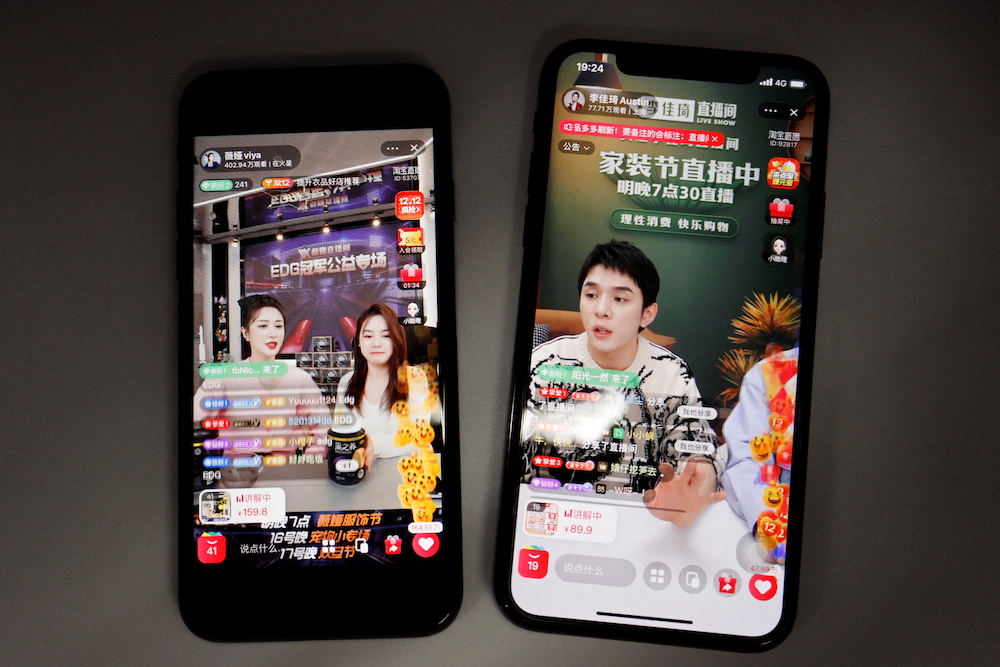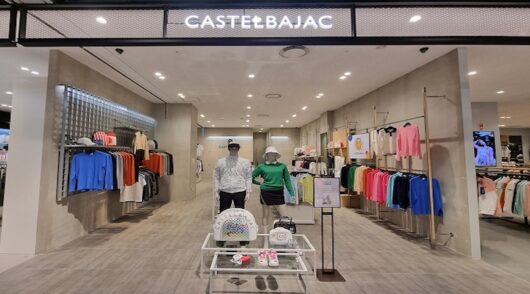China’s ‘common prosperity’ crackdown has turned a harsh spotlight on the country’s massive live-stream e-commerce business – underlining the fragility of a surging sales channel that some of the world’s biggest brands have come to rely on.
More than 100 million followers of Viya, dubbed the country’s ‘queen of live streaming’ by the Chinese media and public, awoke on Tuesday to find her e-commerce and social media accounts shut down after news that she had been fined more than $200 million for tax evasion.
The rise of celebrities partnering with brands from L’Oreal to Unilever and Adidas to sell consumer goods in live online streams has seen the sector billow. Consultancy McKinsey expects the trade in the world’s second-biggest economy to be worth $423 billion next year – more than double estimates for 2020, and bigger than the economies of countries like Norway and Ireland.
But it has also led to an awkward tango for global players, with little choice but to partner with internet stars with the clout – until now – to make or break product sales campaigns. Some, like Viya, have even challenged how sponsors like L’Oreal do business.
Beijing’s vow to be tough on tax dodgers as it seeks to eliminate vast disparities in income at a time of slower economic growth has claimed numerous high-flying victims. But the scale of the fine on Viya, a 36-year-old former singer whose real name is Huang Wei, and who once appeared on a stream with US reality TV star Kim Kardashian, far exceeds that of other well-known cases.
“People were shocked to learn live streamers make so much money,” said Liu Xingliang, president of tech consultancy China Internet Data Center. “With such profitability, Viya’s company could be valued at 100 billion yuan ($16 billion) if it went public.”
Along with Viya’s closest-selling rival by sales, Li Jiaqi – also known as ‘Lipstick Brother’ – the two biggest stars of the sector have come to be seen as crucial for brands seeking to get a product placed on daily evening live-streamed shows on Taobao, the online marketplace owned by Alibaba Group.
So much has their clout grown that the pair broke ties with L’Oreal last month in a public dispute after they accused the French cosmetics giant of not giving their viewers the lowest price on a facial product. L’Oreal later offered shopping vouchers to settle the dispute.
L’Oreal didn’t immediately respond to a request for comment on Viya.
In a statement, Viya apologised for not paying her taxes but could not be reached for further comment. Li’s company told Chinese media on Monday that business operations were normal.
Trust and community
Analysts say live-streaming sales personalities like Viya and Li appeal to Chinese consumers not only because they are entertaining or are able to negotiate steep discounts for their viewers with brands. Crucially, they have been seen as a credible go-between after past scandals involving product quality and fake goods left many distrustful of brands’ claims.
One typical follower is Beijing white-collar worker Liang Ye, who said she usually spends most of her evenings playing Li or Viya’s live streams in the background. Her recent purchases include a Shu Uemura cleansing oil and a Yves Saint Laurent lipstick.
“They sell things that suit you,” she said. “For a facial lotion, Li Jiaqi won’t vaguely say it’s moisturising or anti-aging like most advertising, he will recommend it to people at the right age with the right skin type.”
Unilever China’s chairman and North Asia executive vice president Rohit Jawa, who told Reuters the company has worked with live streamers including Li and Viya since 2019, said the interactive element was its main appeal. Unilever didn’t immediately respond to a request for comment on the Viya case.
“Questions can be answered immediately and be viewed, shared and commented on by others,” Jawa said. “There’s a real sense of community and live streamers have incredibly loyal fans … China definitely leads the way in live streaming and is Unilever’s most advanced e-commerce market globally.”
Growth amid headwinds
The fine doled out to Viya, however, comes after a series of warnings aimed to tighten up practices in the sector and other punishments levelled against some of her smaller peers – a sign that more headwinds could be in store.
The industry saw a sharp jump in the number of new personalities last year, in part due to the Covid-19 pandemic.
Last year, research consultancy iiMedia Research said there were over 28,000 so-called multi-channel network agencies in China, each of which tend to manage multiple online influencers.
But China’s internet watchdog drafted rules for the first time last year – being implemented on trial this year – to regulate the country’s live-streaming marketing industry requiring internet platforms to better monitor their content and ordering live streamers to register with their real names.
Its commerce regulator followed this up with guidelines in August, saying live streamers should speak Mandarin and dress appropriately when promoting products.
Other popular live streamers were also known to be under investigation for tax evasion prior to Viya’s punishment.

On November 22, the third most popular live streamer behind Li and Viya on Taobao, Xueli, was fined 65.55 million yuan for tax evasion and her Taobao live-streaming channel has been suspended ever since. She has also disappeared from social media platforms.
Some analysts, however, said the crackdown could even be good for brands, weakening the bargaining power the top live streamers have and potentially sending traffic to their self-operated stores.
But for all the clouds around the business, one thing remains certain – brands will continue to seek growth via live streaming, and not just in China.
“Live commerce has become table stakes for successful consumer companies in China and much of the rest of Asia,” McKinsey concluded in a report earlier this year, “and is rapidly spreading to Europe and the US.”
‘Oh my God, buy it!’ How live-stream shopping works in China
China’s imposition of a $210 million fine for tax evasion on Viya, an internet celebrity dubbed ‘the queen of live streaming, highlights how quickly the industry has grown to become one of the country’s most popular sales channels in a few short years.
Top Western brands from L’Oreal to Louis Vuitton engage live streamers to help market products on China’s top e-commerce platforms, and analysts now describe it as essential to a brand’s strategy in the world’s second-largest economy.
Where did it all begin?
The first company to combine live streaming online and shopping in China was e-commerce giant Alibaba Group’s Taobao marketplace, which introduced Taobao Live in 2016.
The platform allows influencers to open their own live-streaming channels on Taobao, on which they can market a wide range of products, everything from cosmetics to clothes and snacks to cars. Viya even sold a rocket launch service for 40 million yuan ($6.3 million) last year.
Brands also hold regular live streams, usually anchored by staff or likely lesser-known influencers, on their own self-run online stores on Taobao and Tmall, another Alibaba marketplace.
How does it work and why is it so popular?
Anchors speak to online shoppers, answering questions about size, colour and fit in real-time, engaging them with a chatty, informal approach and also encouraging quick purchases with discounts available for a limited time.
One big attraction is that it all happens on a single mobile app interface – shoppers can watch, ask questions and click to purchase all on the same page during the live stream.
Some of the personalities, especially top sellers like Viya and her main rival Li Jiaqi, have also grown extremely popular as they are seen by consumers as a credible go-between after past scandals involving product quality and fake goods left many distrustful of brands’ claims.
Top influencers also develop their own popularity with shoppers, as well as that of brands. Viya’s image became that of a reliable, friendly ‘sister’, while the excitement in Li Jiaqi’s catchphrase “Oh my god, buy it!” appeals to many.
Getting a product placed on their live streams is seen as a big vote of confidence in the quality, consumers and brands say.
Li counts 47 million followers on his Taobao live stream room and Viya, prior to the shuttering of her room, counted more than 90 million followers.
How big is it in China?
The pandemic was a big boost for the live-streaming industry as it confined people to their homes during lockdowns, spurring demand for online entertainment and shopping services. Beyond the big names, there are now thousands of live-streaming anchors operating in China.
Last year, research consultancy iiMedia Research said there were more than 28,000 so-called multi-channel network agencies in China, each of which tends to manage multiple online influencers.
Many e-commerce platforms, including ByteDance’s Douyin, the Chinese equivalent of TikTok, Kuaishou, JD.com and Pinduoduo now offer their users the opportunity to shop via live stream. Douyin is extremely popular and a keen rival to Taobao on this front.
The types of hosts also vary widely in China. Farmers to factory owners, government officials to the heads of top Chinese companies such as travel giant Trip.com have all appeared on live streams to hawk products.
In July, consultancy McKinsey said the value of China’s live-commerce market grew at a compound annual growth rate of more than 280 per cent between 2017 and 2020, to reach an estimated $171 billion in 2020. It anticipates Chinese sales reaching $423 billion by 2022.
Is any of this gaining traction overseas?
International brands say that the Chinese e-commerce market and the live streaming sales channel, is far ahead of that of other markets but some platforms are testing the model in other countries.
In November, for instance, NBCUniversal made its live-stream shopping debut with a show on Instagram.
TikTok is also testing live-streamed shopping, and Snap Inc is investing in augmented reality technology to help Snapchat users virtually try on items like watches, jewellery and other apparel to cut down on returns.
The industry is expected to balloon to $50 billion from $36 billion in annual U.S. sales by 2023 according to research firm eMarketer.
- Reporting by Brenda Goh and Sophie Yu; Editing by Kenneth Maxwell, of Reuters.






